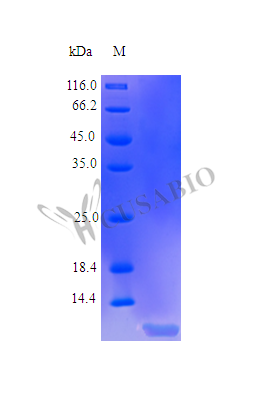This Recombinant Human TNFRSF13C (CD268) protein is a powerful for cancer research. TNFRSF13C, also known as Tumor necrosis factor receptor superfamily member 13C, plays a crucial role in immune regulation and is associated with various cancer-related processes.
Our TNFRSF13C protein is produced using an E. coli expression system and covers amino acids 1 to 76, representing a partial length of the TNFRSF13C sequence. It is tag-free, ensuring its native conformation and eliminating any potential interference in downstream applications. With a purity exceeding 95% and minimal endotoxin contamination, our TNFRSF13C protein is very helpful to get reliable and consistent results.




